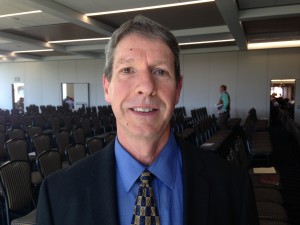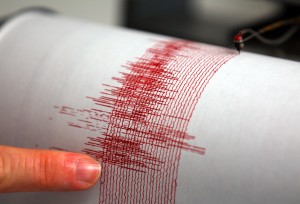Could Evidence of Manmade Quakes Bring Tectonic Shift in Texas Regulation?
There have been earthquakes in almost every corner of Texas since the start of the state’s most recent oil and gas boom. One “swarm” that really captured people’s attention started in the town of Azle in 2013. When oil and gas regulators at the Railroad Commission of Texas visited the town, local people suggested ways to handle the waste water disposal wells thought to be causing the quakes. One idea came up over and over again.
“Why is it we can’t shut the wells down around here for a period of time?” asked resident Gale Wood. “If nothing happens after a while, that would be one way to determine what’s going on.”
The Railroad Commission has a different approach. In the case of Azle, it waited over a year while a team of seismologists at Southern Methodist University undertook a study. The results came back this month, confirming that disposal wells likely caused the quakes. That has some residents in Texas’ quake country hoping the simple notion put forth at that public meeting -shut down disposal wells if there’s a chance they’re related to earthquakes- may get another hearing.
“When I saw the report I thought ‘wow, finally people will realize that we’re not as dumb as they were trying to make us look,'” says Lynda Stokes, Mayor of the town of Reno, near Azle. “It makes a lot more sense to shut them down. [To] take care of your citizens.”

Doualy Xaykaothao / KERA News
Lynda Stokes is the mayor of Reno in Parker County, where dozens of medium-sized earthquakes have been recorded in an area that used to be quake-free.
Under rules it adopted last year, the Railroad Commission doesn’t shut down a disposal well unless there’s scientific data suggesting the well caused a quake. That data can take months or years to gather.
“There’s no diagnostic tool that can help us just say ‘this earthquake was cause by wastewater injection, this earthquakes was caused by the fracking process, this earthquake was a natural earthquake,” says Mark Peterson, a scientist with the US Geological Survey who just authored another report out this month re-affirming the link between oil and gas activity and earthquakes.
So, even if scientists know disposal wells can cause quakes, and quakes start happening around a well, Texas regulators require earthquake research. Some other regulatory agency’s recommend a more aggressive approach.
“We are strongly recommending being proactive… get in front of it,” says Philip Dellinger. He’s head of the team that deals with disposal wells at EPA’s Region Six office in Dallas.
This year the EPA released recommendations for how states should manage manmade earthquake risks. That includes proposal similar to a system known in the industry as the “traffic light model.”

Photo by Philip Issa
Philip Dellinger is head of the EPA’s Underground Injection Control Section for Region 6 in Dallas.
“What that means is when you think you might be dealing with potential future induced earthquakes, you can go into a well operators permit and say ‘hey we’re gonna let you do this,’ says Dellinger. “But if we start getting earthquakes and if those earthquakes reach a magnitude over some defined magnitude. We’re gonna bump up what you have to do.”
That “yellow light” could mean the operators wouldnt be able to inject as much wastewater into the well or would need to inject it as a lower volume.
“The red light would be if it gets over magnitude X. you shut in the well,” says Dellinger.
In Texas, disposal well operators have shut down well, or changed the amount they pump into them after quakes. But such actions are voluntary and rarely discussed publicly. In Oklahoma, the traffic light system is part of official regulation.
But even after the most recent scientific reports, Reno Mayor Lynda Stokes doesn’t think the Railroad Commission is likely to adopt those rules. She points out that Commissioners still publicly question the link between oil and gas and the surge in quakes. A fact confirmed in an interview with Railroad Commissioner Ryan Sitton late last week.
“I am very much not convinced that there is a causal link that has been determined yet,” said Sitton. He’s called for a public hearing reviewing the study that links the Azle quakes to disposal wells. No date on that yet, but in June the Railroad Commission will hold two hearings to determine whether two disposal wells in Azle will be shut down.


